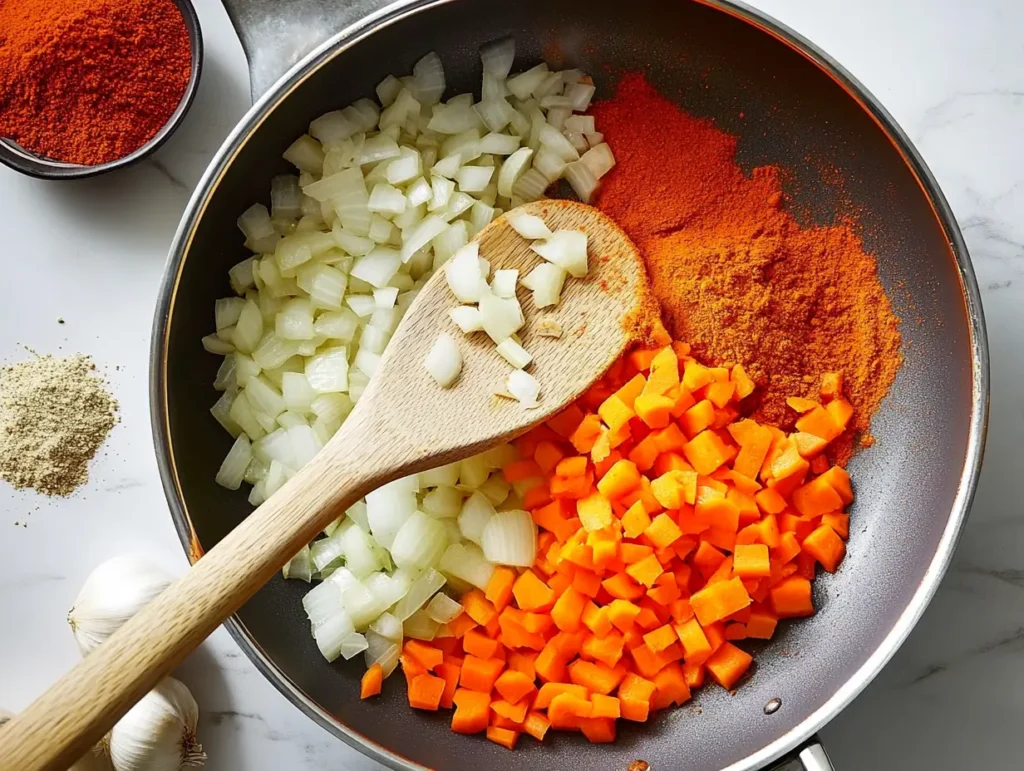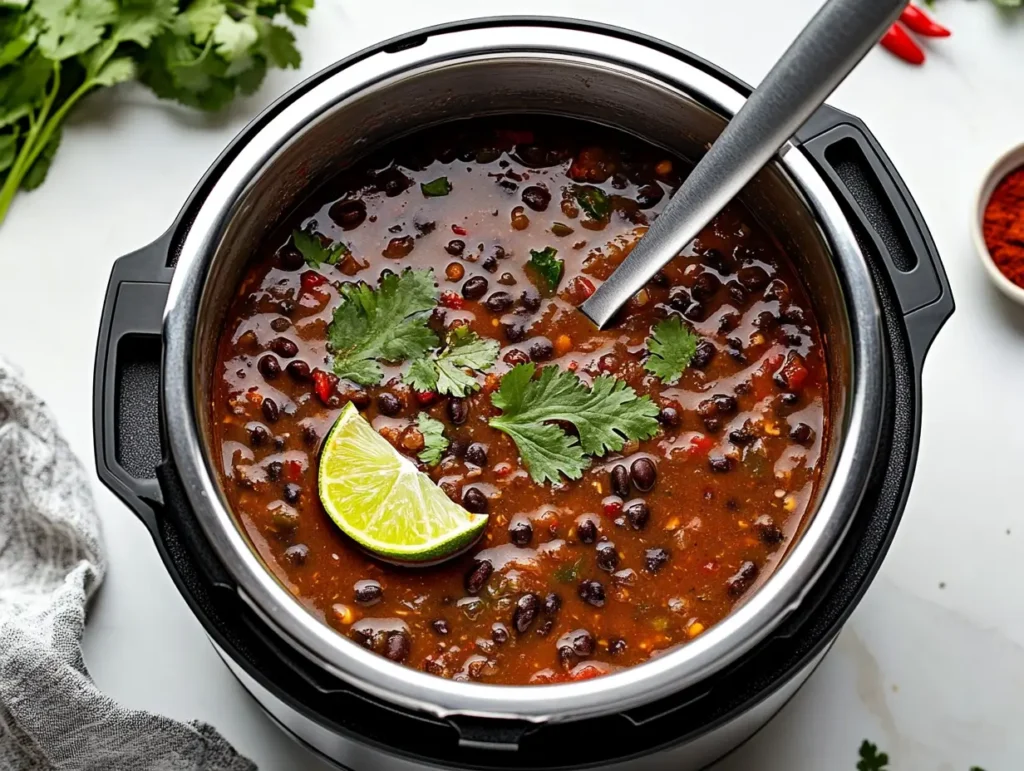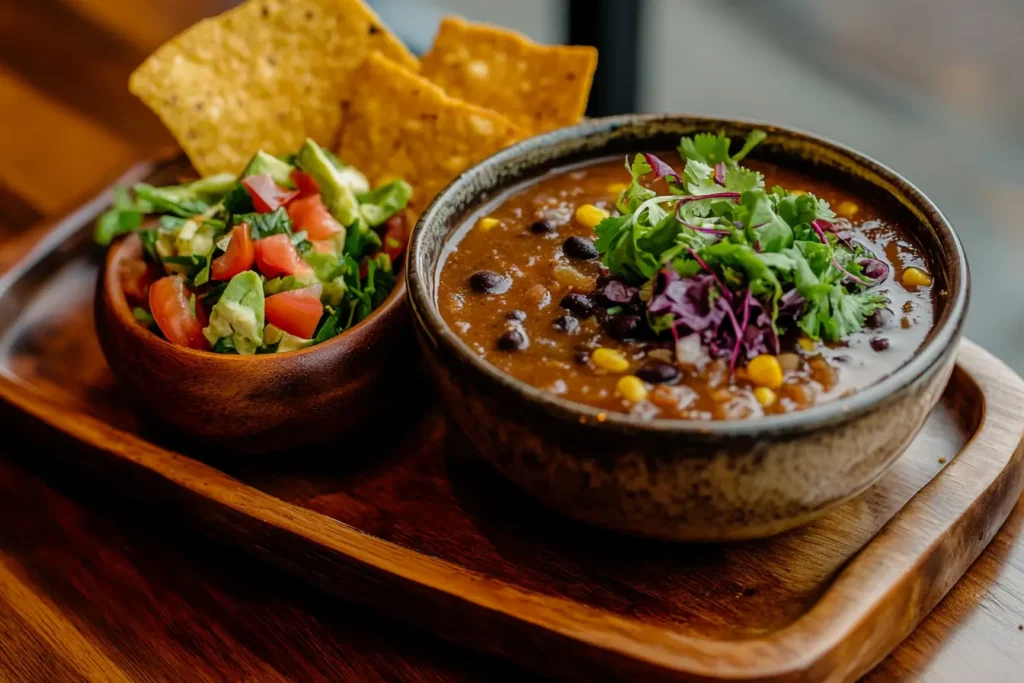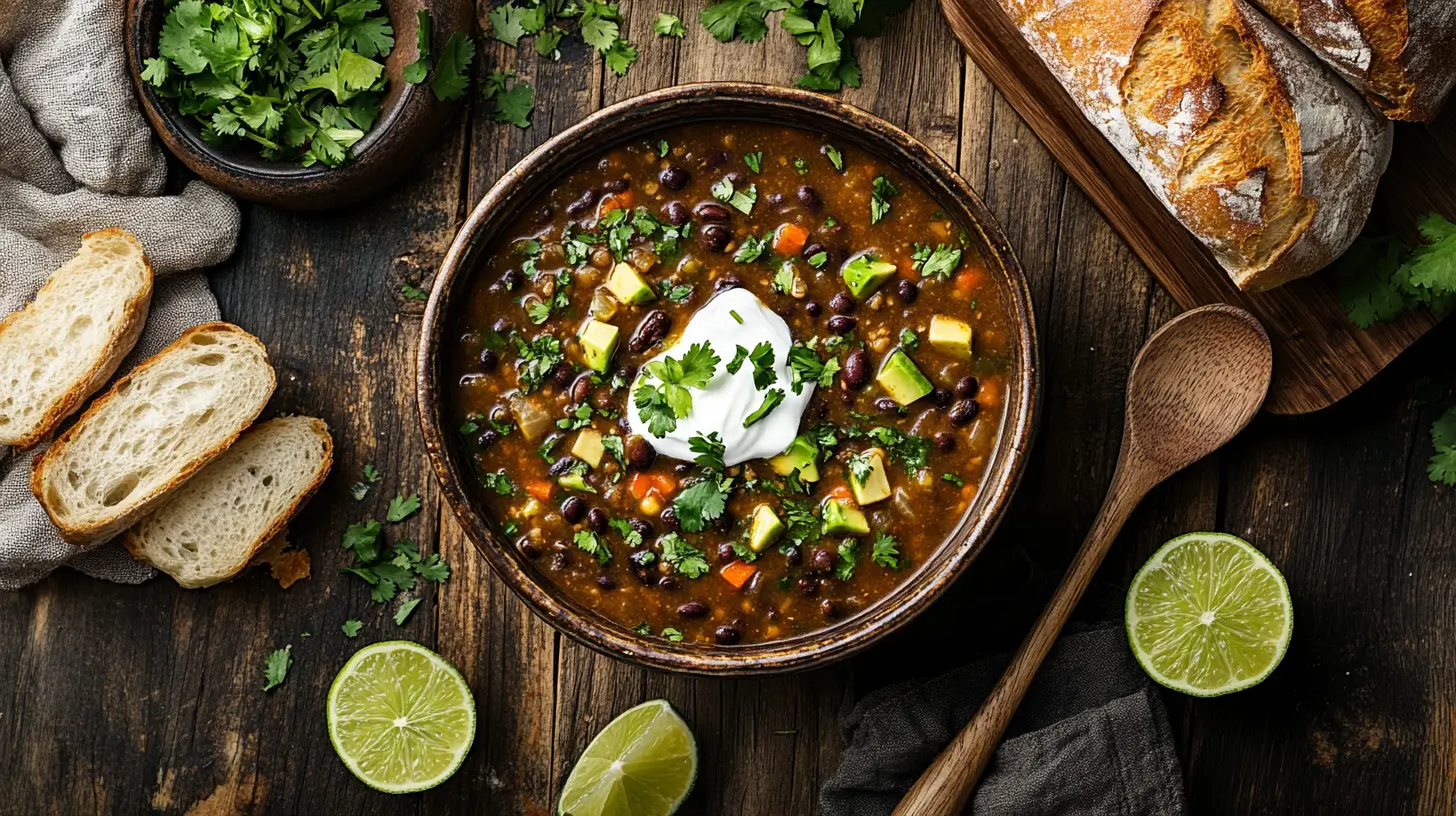Introduction
Welcome to YUMA Recipes, where delicious and accessible cooking ideas come to life. Black bean soup is a crowd-pleaser, offering a comforting and hearty option for lunch. But if you’ve ever asked yourself, “Why does my black bean soup taste bitter?”, you’re not alone. Bitterness is a common issue that can ruin an otherwise perfect dish.
This article will explore the reasons behind bitterness in black bean soup and, more importantly, how to fix it. From understanding the role of fresh ingredients to learning how to balance flavors, you’ll gain all the tips you need to make a perfectly seasoned soup. Plus, we’ll share an Instant Pot Black Bean Soup Recipe that saves time without sacrificing taste.
If you’ve been frustrated by bitter soup in the past, you’re in the right place. You’ll also discover solutions for common cooking mistakes and simple tricks to improve your soup’s flavor. Whether you’re a busy parent, a student, or just someone who loves a good bowl of soup, this guide is for you.
Don’t forget to check out our guide to preparing black bean soup with optimal flavor for even more insights!
If you’ve ever asked yourself, ‘Why is black bean soup bitter?’, this guide will help you understand and fix the issue.
Understanding the Bitterness in Black Bean Soup
What Causes Bitterness in Black Bean Soup?
Bitterness in black bean soup can arise from several factors. The most common culprit is old beans, which tend to develop an unpleasant taste over time. Black beans naturally contain tannins, a compound that can taste bitter if the beans are not cooked properly.
Another frequent issue comes from improperly cooked aromatics like onions and garlic. While these ingredients add depth and richness to the soup, burning them during the sautéing process can create a bitter base. Overusing spices like bay leaves, cumin, or oregano can also overwhelm the dish and mask its natural flavors.
Additionally, a lack of proper seasoning—particularly salt—can make the bitterness in black bean soup more noticeable. Salt plays a critical role in balancing flavors by suppressing bitter notes and enhancing the overall taste of the soup.
Can Bitterness Be Avoided?
Fortunately, bitterness can be avoided by making a few thoughtful choices. First, always opt for fresh, high-quality ingredients. For dried beans, inspect them for smoothness and avoid beans that are discolored or cracked. If you’re using canned beans, rinsing them thoroughly can remove preservatives that might contribute to bitterness.
Cooking techniques also matter. Pre-soaking dried beans can help remove tannins, while sautéing aromatics at a moderate temperature prevents burning. Finally, incorporating ingredients like lime juice or sweet vegetables such as carrots can brighten the flavors and counteract any bitterness.
By taking these precautions, you can ensure your black bean soup is rich, flavorful, and free of any unpleasant bitterness.
Key Tips to Avoid Bitterness in Black Bean Soup

Start with Fresh Ingredients
The quality of your ingredients significantly impacts the flavor of your soup. Using old or improperly stored beans is one of the leading causes of bitterness. Dried beans lose their freshness over time, and older beans require longer cooking times, which can lead to uneven textures and off flavors.
To avoid this, purchase dried beans from a reliable source and check the expiration date. For canned beans, ensure you rinse them under cold water to wash away any metallic or preservative flavors.
Soak and Rinse Beans Properly
Pre-soaking dried beans isn’t mandatory when using an Instant Pot, but it can still offer benefits. Soaking helps to remove some of the tannins, reducing the risk of bitterness. Place the beans in a large bowl, cover them with water, and soak overnight. For a quicker option, use hot water and soak for at least an hour.
When using canned beans, rinsing is a must. This step not only eliminates excess sodium but also removes any potential bitterness from the packing liquid.
Cook Aromatics with Care
Aromatics like onions, garlic, celery, and carrots form the foundation of any good soup. However, cooking them improperly can lead to burnt flavors that permeate the entire dish. Always sauté these ingredients over medium heat, stirring frequently. Adding a pinch of salt during this step helps to draw out their natural sweetness.
For extra flavor, consider incorporating bell peppers or jalapeños into your sauté. These vegetables not only enhance the soup but also add a mild sweetness to counterbalance any bitter undertones.
Balance Bitter Flavors with Complementary Ingredients
If you find your soup tasting slightly bitter, there are several ways to fix it. Adding a teaspoon of sugar or honey can introduce a touch of sweetness that neutralizes bitterness. Similarly, acidic ingredients like lime juice, apple cider vinegar, or tomatoes can brighten the soup and create a harmonious balance of flavors.
Don’t underestimate the importance of salt. A well-seasoned soup allows all the flavors to shine while minimizing any bitterness. Taste your soup frequently as it cooks, and adjust the seasoning gradually.
With these simple strategies, you’ll never have to wonder, “Why does my black bean soup taste bitter?”, again.
The Instant Pot Advantage
Why Use an Instant Pot for Black Bean Soup?

The Instant Pot is a modern kitchen marvel that takes the hassle out of cooking. When it comes to black bean soup, it offers:
- Faster Cooking Times: Dried beans cook to perfection in under an hour, eliminating the need for overnight soaking.
- Flavor Infusion: The pressure cooking process melds flavors beautifully, ensuring a rich and savory result.
- Consistency: With precise temperature control, the Instant Pot delivers evenly cooked beans every time.
If you’re short on time or just want a foolproof method, the Instant Pot is the way to go.
Step-by-Step Instant Pot Method
- Sauté Aromatics: Turn on the sauté function and add olive oil. Sauté onions, garlic, carrots, and celery until soft and fragrant.
- Add Beans and Spices: Incorporate black beans, cumin, smoked paprika, chili powder, and a bay leaf. Stir well to coat the beans with seasoning.
- Add Liquid: Pour in low-sodium chicken or vegetable broth, ensuring the beans are fully submerged.
- Cook Under Pressure: Lock the lid, set the Instant Pot to high pressure, and cook for 40 minutes (35 if using canned beans).
- Natural Release: Allow the pressure to release naturally for 10–15 minutes before venting manually.
- Adjust and Serve: Remove the bay leaf, adjust seasoning with salt, lime juice, and pepper, then blend part of the soup for a creamier texture.
Pro Tips for Success
- Use low-sodium broth to control salt levels.
- Always deglaze the pot after sautéing by scraping up browned bits; this prevents burning and adds depth to your soup.
- Add fresh herbs like cilantro at the end for a burst of flavor.
With the Instant Pot, you can enjoy a perfectly cooked, flavorful soup without spending hours in the kitchen.
Recipe – Instant Pot Black Bean Soup
Ingredients
- 1 pound dried black beans (or 3 cans, rinsed)
- 1 medium onion, diced
- 3 garlic cloves, minced
- 2 carrots, peeled and diced
- 2 celery stalks, chopped
- 1 bay leaf
- 1 teaspoon cumin
- 1 teaspoon smoked paprika
- ½ teaspoon chili powder
- 4 cups low-sodium chicken or vegetable broth
- Juice of 1 lime
- Salt and pepper to taste
- Optional toppings: diced avocado, fresh cilantro, sour cream, shredded cheese
Instructions
- Sauté Aromatics: Heat olive oil in the Instant Pot using the sauté function. Cook onions and garlic until translucent, about 3 minutes. Add carrots and celery, and sauté for another 2 minutes.
- Season the Base: Stir in cumin, smoked paprika, and chili powder. Cook for 1 minute to release the spices’ aromas.
- Add Beans and Liquid: Add black beans, bay leaf, and broth. Stir to combine.
- Pressure Cook: Seal the lid, set the Instant Pot to high pressure, and cook for 40 minutes (reduce to 30 minutes for canned beans).
- Natural Release: Allow the pressure to release naturally for 10 minutes before manually venting.
- Adjust Flavors: Remove the bay leaf. Stir in lime juice, salt, and pepper. Blend a portion of the soup for creaminess, leaving some beans whole for texture.
- Serve and Enjoy: Garnish with your favorite toppings and serve with crusty bread or tortilla chips.
Fixing Bitter Black Bean Soup
Common Black Bean Soup Mistakes
Even the best cooks encounter challenges. Common mistakes include:
- Using Old Beans: As mentioned earlier, older beans lead to inconsistent cooking and unpleasant flavors.
- Burning Aromatics: High heat can quickly turn garlic and onions bitter, so always sauté gently.
- Overusing Bay Leaves: A single leaf is enough for most recipes; too many can overwhelm the soup.
How to Fix Bitter Soup
If your soup tastes bitter, don’t worry—it’s fixable! Try these remedies:
- Add Sweetness: A small amount of sugar, honey, or even sweet vegetables like corn can balance bitter notes.
- Brighten with Acidity: Lime juice or apple cider vinegar can counteract bitterness effectively.
- Adjust Seasoning: Taste the soup and add salt or soy sauce as needed to bring out other flavors.
Pro Techniques for Better Soup Flavor
- Use smoked paprika or chipotle peppers to add depth and richness.
- Partially blend the soup to create a creamy texture without adding dairy.
- Stir in fresh herbs like cilantro or parsley at the end for a pop of freshness.
Pairing and Serving Ideas

Best Sides for Black Bean Soup
- Cornbread: Adds a hint of sweetness and a satisfying texture.
- Tortilla Chips: Perfect for dipping.
- Simple Salad: A light, refreshing side dish that balances the richness of the soup.
Garnishing for Extra Flavor
Enhance your soup with:
- Fresh cilantro or parsley
- Diced avocado
- A dollop of sour cream or plain Greek yogurt
- Shredded cheddar or Monterey Jack cheese
Nutritional Benefits of Black Bean Soup
Black beans are not only delicious but also highly nutritious. They’re packed with fiber, plant-based protein, and essential vitamins like folate and magnesium. This soup is excellent for:
- Heart Health: The combination of fiber and antioxidants supports cardiovascular health.
- Weight Management: Black beans are filling and low in calories, making them ideal for a balanced diet.
For those watching their sodium intake, using low-sodium broth and adjusting seasoning ensures a healthier option without compromising taste.
FAQs
How to get rid of the bitter taste in black bean soup?
Add a teaspoon of sugar, honey, or sweet vegetables like carrots. A splash of lime juice can also brighten flavors and mask bitterness.
Why do my black beans taste bitter?
This could be due to old beans, improper cooking techniques, or overuse of strong spices like bay leaves.
How to make black bean sauce less bitter?
Balance flavors by adding sugar or a sweetener, along with an acidic ingredient like vinegar or citrus juice.
How do you get the bitter taste out of beans?
Soak and rinse beans thoroughly before cooking. Adding salt or acidic ingredients during or after cooking can also neutralize bitterness.

